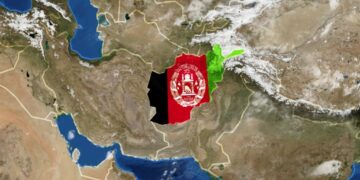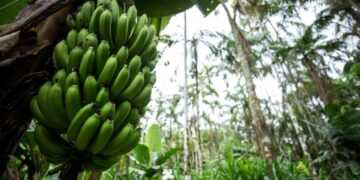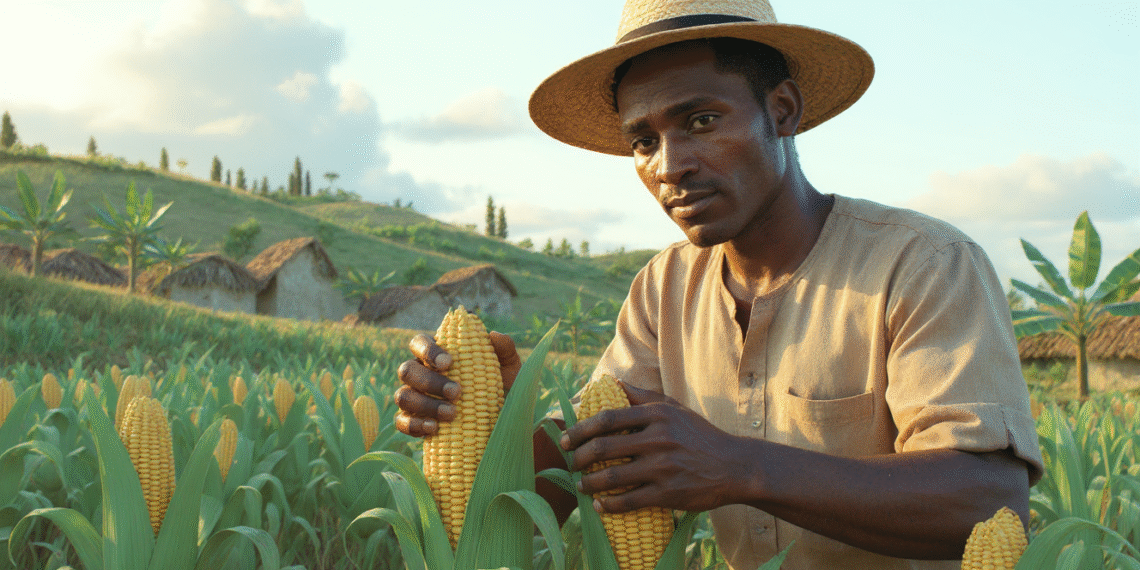RESEARCH ARTICLE
Joel N. Christoph
European University Institute (EUI)
This article is part of a special issue titled Bridging Power and Knowledge: Addressing Global Imbalances in Knowledge Systems for Sustainable Futures.
PLAIN-LANGUAGE SUMMARY
Climate Challenge
Nigeria’s economy is heavily dependent on agriculture, with the majority relying on subsistence farming. Longer dry spells in northern regions and unpredictable rainy seasons in the south threaten agricultural productivity.
Indigenous Wisdom
Indigenous communities in southeastern Nigeria have developed sophisticated ecological knowledge over centuries to cope with environmental stressors, living in harmony with their environment.
Bridging Knowledge Systems
This study explores how bridging indigenous knowledge with scientific knowledge can enhance climate adaptation strategies for rural communities facing environmental challenges.
Collaborative Solutions
The research proposes frameworks for equitable partnerships that emphasize capacity-building, inclusive governance, and knowledge co-production for long-term socio-ecological sustainability.
WATCH A SUMMARY OF THE ARTICLE
LISTEN TO THE PODCAST
Abstract
This article explores how local and indigenous knowledge in Southeastern Nigeria can be effectively integrated with scientific approaches to improve climate adaptation strategies and foster sustainability. While formal scientific research has largely shaped the global climate agenda, indigenous resource management practices have evolved over centuries to address environmental fluctuations and hazards. However, significant power imbalances often sideline local communities from meaningful engagement in policy and research collaboration. Drawing on qualitative fieldwork, participatory rural appraisal methods, and quantitative climate modeling, this study investigates how traditional ecological knowledge, gleaned from farmers, fishers, and community elders, can enhance scientific methods for climate resilience. Findings illustrate that local practices such as rotational crop selection, water resource management, and communal seed-banking offer valuable insights to complement advanced modeling techniques, especially in mitigating extreme weather events and adapting to shifting precipitation patterns. Additionally, a robust framework for equitable partnerships is proposed, emphasizing capacity-building, inclusive governance, and knowledge co-production. The article concludes by stressing that efforts to bridge power differentials and integrate epistemic perspectives hold tremendous promise for achieving long-term socio-ecological sustainability in the Global South.
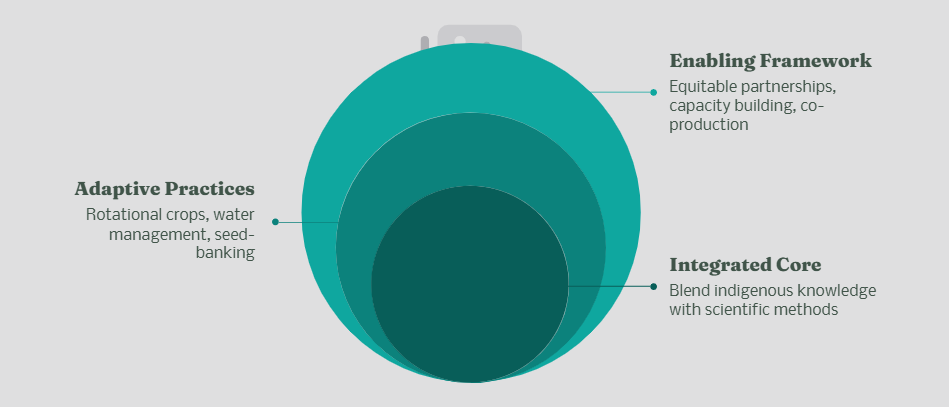
Keywords: climate adapatation, indigenous knowledge, traditional ecological knowledge, participatory research methods, southeastern Nigeria, knowledge co-production
Introduction
Global climate change poses one of the most pressing challenges for contemporary societies, disproportionately impacting vulnerable regions such as Sub-Saharan Africa. The challenges of climate change are not the same across all geographical areas of Nigeria due to two precipitation regimes: high precipitation in parts of the Southeast and Southwest and low in the Northern Region. Rising sea levels, fluctuating rainfall, higher temperatures, flooding, droughts, desertification, land degradation, and extreme weather events are all contributing factors. (Leal Filho et al., 2023) Southeastern Nigeria, characterized by a tropical climate, complex river systems, and agriculturally dependent communities, faces increasing threats from shifting rainfall patterns, periodic flooding, and soil degradation (IPCC, 2021). While scientific research plays a critical role in quantifying these threats and proposing technological solutions, local and indigenous communities have historically developed sophisticated forms of ecological knowledge to cope with environmental stressors, living in harmony with their environment and believing that everything in nature serves a particular purpose (see Figure 1 for an illustration of traditional knowledge transfer in these communities).
Nigeria’s economy is highly dependent on agriculture, primarily subsistence farming (including crops like maize, cassava, yams, millet, and livestock). This sector is highly vulnerable to climate change. Climate challenges, such as longer dry spells in northern regions and unpredictable rainy seasons in the south, threaten agricultural productivity. The resulting difficulty in planning for reliable rainfall leads directly to crop failures, increased poverty, and food shortages.
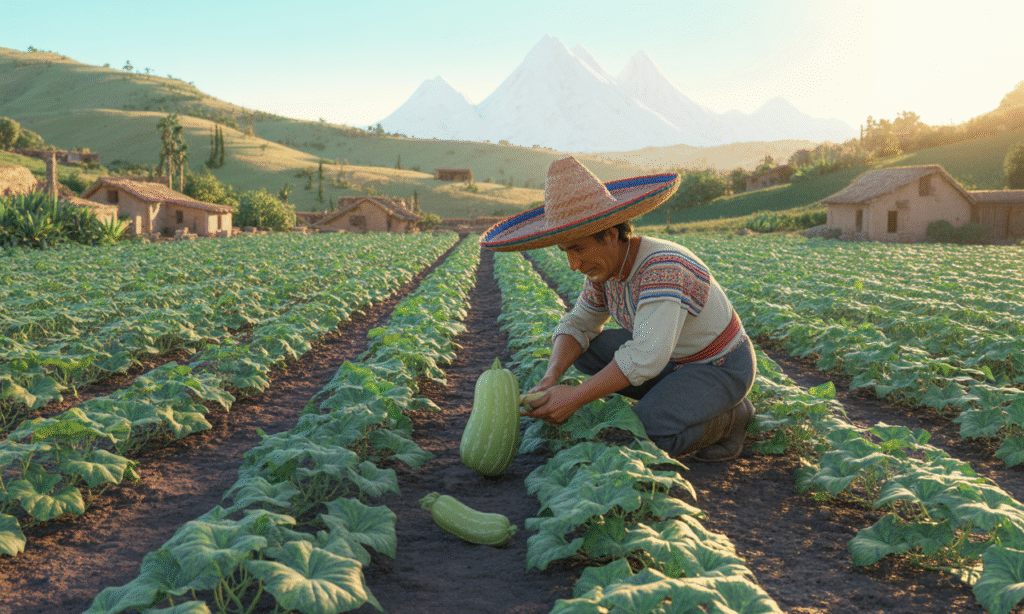
Figure 1: Traditional knowledge transfer in southeastern Nigerian farming communities
The tension between global scientific knowledge and local practical wisdom reflects broader imbalances in power and epistemic authority. Policy agendas and research funding are predominantly steered by institutions in the Global North, potentially overlooking region-specific experiences and indigenous coping mechanisms. (Okedele et al., 2024) The concept of “bridging knowledge worlds” refers to the idea of creating synergistic spaces where local and scientific knowledge systems can co-exist, inform each other, and co-produce evidence-based solutions for sustainability. This paper examines the processes, outcomes, and policy implications of such a collaboration, focusing on Southeastern Nigeria as a case study.
This research aims to highlight how indigenous strategies can refine and enrich scientific insights while also illustrating the institutional and political challenges of establishing equitable partnerships. A mixed-methods approach, involving both qualitative and quantitative tools, was employed to capture the complexity of local environments and experiences. This study is organized into several sections. Following this introduction, the second section reviews relevant literature on indigenous knowledge, participatory methods, and climate resilience. The third section outlines the methodology, while the fourth section provides an overview of the study context and data collection procedures. The fifth section details the results, followed by a discussion in the sixth section on bridging knowledge systems. The final section concludes with recommendations for policymakers, researchers, and local stakeholders, advocating for more collaborative and inclusive climate adaptation frameworks.
LITERATURE REVIEW
Indigenous Knowledge and Climate Adaptation
Indigenous knowledge represents an evolving body of understandings, skills, and philosophies developed by local communities over extended periods, often through direct interaction with nature (Agrawal, 1995). Indigenous Peoples are custodians of unique knowledge systems, innovations and practices that have been passed down through generations, allowing different cultures to live sustainably. Many Indigenous traditional practices are rooted in deep understanding of and respect for ecological systems and promote sustainable resource use with minimal environmental impact. In climate adaptation, IK includes strategies like diversified cropping, controlled burning, agricultural rituals, and water-harvesting techniques tailored to specific ecological conditions (Berkes, 2012).
While conventional scientific research offers macro-level climate models, it often overlooks the socio-cultural factors influencing community responses. Indigenous knowledge is dynamic, rooted in a deep involvement with nature, and is now recognized as capable of adapting to new conditions and generating robust, context-specific solutions when integrated with scientific insights (Chambers, 1994).
Participatory Approaches in Knowledge Production
Recognizing the limitations of top-down interventions, participatory approaches have gained traction in development studies and climate adaptation research. Participatory Rural Appraisal (PRA) and its variants seek to involve community members in every stage of the research cycle, from identifying problems to co-creating solutions (Chambers, 1994). By embedding local perspectives and priorities into research design, such methods help level power asymmetries and foster mutual learning.
This collaborative model is especially valuable in climate adaptation, where success depends not only on ecological or technological feasibility but also on social acceptance and cultural resonance. The social networks and institutions of indigenous communities enable collective action which strengthens reciprocal relationships. Communities maintain their traditional ecological knowledge through cultural festivals and oral traditions passed from generation to generation, serving as a practical tool that helps adapt to climate risks and promotes socio-ecological resilience. However, ensuring these processes are truly inclusive requires significant time, resources, and institutional commitment.
Bridging Power Imbalances in Research Collaboration
Policymakers, researchers, and practitioners seem to underplay the role of indigenous knowledge in climate change adaptation and disaster risk reduction, thereby reducing the effectiveness of proposed climate actions and risk reduction measures. Global imbalances in knowledge systems are partly rooted in systemic inequalities in funding, agenda setting, and peer-reviewed publication opportunities. Researchers from high-income countries often direct the scope and methodology of climate studies in the Global South, potentially marginalizing local priorities. Efforts to correct this imbalance include multi-stakeholder partnerships, capacity-building initiatives, and policy frameworks that center local agency (Scoones, 1998).
In Southeastern Nigeria, where local ecosystems are as varied as they are fragile, bridging these imbalances is crucial for building climate resilience. Moreover, the historical legacies of colonial administrative structures and externally driven development programs can complicate the reception and implementation of new scientific approaches. When indigenous knowledge is validated and integrated into formal research processes, communities are more willing to adopt complementary innovations and share responsibility for adaptation measures.
METHODOLOGY
Study Design
This study adopts a mixed-methods approach, combining qualitative and quantitative components to capture the multidimensional nature of climate adaptation. The research design is grounded in Community-Based Participatory Research (CBPR) principles, ensuring that local perspectives guide data collection, analysis, and dissemination. By converging scientific modeling with indigenous knowledge, the research aims to produce findings that are both empirically robust and socially relevant (Adger, 2006) (Ayanlade et al., 2023).
Qualitative Methods
Qualitative data were gathered through focus group discussions, in-depth interviews, and participatory observation. Focus groups were held with smallholder farmers and fisherfolk across three local government areas in Southeastern Nigeria. A semi-structured interview guide covered questions regarding seasonal changes, water management practices, and community coping mechanisms. Field notes and audio recordings were transcribed and coded, using thematic analysis to identify patterns and divergences. This process illuminated the relationship between adaptive strategies and socio-cultural norms, including how resource access and land ownership intersect with climate vulnerability.
Quantitative methods centered on downscaled climate modeling and basic statistical analyses of rainfall and temperature patterns. Climate data from the ERA5 dataset (IPCC, 2021) were used to generate localized projections for mean annual rainfall, temperature fluctuations, and the frequency of extreme weather events (e.g., extended dry spells). This modeling was cross-referenced with agricultural yield data and community-level reports of crop loss to create a more holistic picture of risk exposure and adaptive capacity. Statistical significance was determined by standard thresholds (p < 0.05), although the study emphasizes that social context is equally crucial in interpreting these results.
Ethical Considerations
All research activities were conducted in alignment with institutional review board (IRB) guidelines and local ethical standards. Participants were briefed on the objectives and potential outcomes of the study, with informed consent obtained orally and in writing where applicable. Confidentiality was preserved by anonymizing personal identifiers in transcripts and publications. Additionally, the participatory nature of the research ensured that community members had a say in how findings would be shared, both within and beyond their locality.
STUDY CONTEXT AND DATA COLLECTION
Regional Profile: Southeastern Nigeria
This empirical analysis assesses the economic and environmental impacts of traditional agroforestry practices on agricultural productivity, income stability, and climate resilience in rural Mexico. It details the econometric models, regression results, and outcome discussion.
Southeastern Nigeria’s ecology is characterized by dense rainforest zones, rolling hills, and a network of rivers that sustain local fishing and agriculture. The region’s climate is bimodal, featuring a lengthy rainy season and a relatively short dry period. However, in recent years, irregular precipitation has led to flooding and soil erosion in low-lying areas, while drought-like conditions have been observed in upland zones. Poverty rates remain high in certain rural pockets, where infrastructural deficits and limited access to formal financial mechanisms exacerbate vulnerability.
Rural livelihoods predominantly revolve around cassava, yam, maize, and various vegetables, with households often practicing mixed cropping systems. Fisheries in local rivers and ponds also contribute to livelihoods, especially during the rainy season when fish stocks are typically replenished. Traditional cultural practices, including community festivals and rites, often revolve around agricultural cycles, reinforcing communal resource management.
Fieldwork and Data Collection Procedures
Fieldwork spanned nine months, starting with a pilot phase that helped refine the interview guides and establish trust with community leaders. Local stakeholders, including village heads and women’s group representatives, facilitated introductions and provided context on customary rules for resource management. Approximately 120 participants took part in focus group discussions, stratified by gender and age to capture diverse perspectives. These discussions were held in communal spaces, such as school compounds and village meeting halls, to ensure accessibility.
In-depth interviews were conducted with 35 key informants identified as having specialized knowledge of local resource management. These included elders recognized for their expertise in reading seasonal weather patterns, farmers experimenting with new seed varieties, and individuals responsible for communal water distribution. Interviews typically lasted 60–90 minutes and probed deeper into the decision-making rationale behind adaptation measures.
On the quantitative side, daily rainfall and temperature records from 2000 to 2020 were sourced from the ERA5 dataset, supplemented by additional station data from the Nigerian Meteorological Agency (NiMet). The aggregated dataset was then used to generate short- and medium-term climate scenarios (up to 2040), focusing on projected changes in precipitation intensity and average temperature levels. These projections were mapped against local agricultural calendars to assess alignment or discrepancies with indigenous interpretations of climate cues.
RESULTS
Complementarities Between Local and Scientific Knowledge
The analysis reveals strong complementarities in certain areas of climate adaptation. Indigenous people predict weather with signs of warning using social, bio-physical and ecological indicators. They pay attention to behavior and appearance of various environmental entities like insects, plants, birds and animals, moon-star alignment, animal intestine interpretation, and tide flow and direction of currents. (Fabiyi & Oloukoi, 2013) For instance, local communities rely on rain pattern observation and the arrival of certain migratory birds to predict oncoming seasonal shifts, aligning closely with observed changes in the precipitation records. While remote sensing technologies and climate models can provide predictive indicators several months ahead, the communities’ on-the-ground observations offer immediate and context-specific cues, valuable for short-term response measures such as planting or harvest adjustments.
Similarly, local resource management practices, such as fallow rotation and seed exchange networks, resonate with scientific recommendations on biodiversity conservation. Researchers have long advocated crop diversification as a means to minimize risk, and the indigenous practice of rotating farmland plots emerged as a strategy that aligns with modern ecological principles (Folke, 2006).
Adaptive Practices in Water Resource Management
One of the most striking findings centers on water resource management. Many rural communities that experience water scarcity utilize several traditional methods of rainwater harvesting to store and conserve water for domestic and irrigation purposes. Such traditional skills have been passed down from generation to generation and have contributed to boosting food security. Many communities in Southeastern Nigeria operate rotational water-sharing systems, governed by customary authorities who establish usage schedules and maintain communal infrastructure. In a context of limited public irrigation facilities, these local protocols effectively distribute scarce resources during dry spells. Statistical analysis showed that areas with such protocols experienced significantly lower rates of crop failure compared to nearby zones lacking comparable communal systems (p < 0.05). Further, the synergy between communal resource management and modern water conservation techniques—suchs as small-scale drip irrigation—highlights the potential for integrated approaches to tackle water scarcity.
Perceived Gaps in Research and Policy
Despite the noteworthy overlap, several gaps and tensions remain. Local communities frequently criticized external researchers for not returning results or engaging in long-term partnerships, echoing wider concerns about extractive research practices (Sillitoe, 1998). Additionally, although climate modeling can capture large-scale trends, communities highlighted the unpredictability of localized climatic events such as flash floods, which remain challenging to integrate into predictive models. Government policies often lack meaningful consultation processes, resulting in adaptation measures that may be technologically advanced but socially or culturally misaligned with local needs.
Knowledge Complementarities
- Local weather prediction through natural indicators
- Traditional crop rotation aligning with biodiversity science
- Indigenous water management supporting modern conservation
Research Challenges
- Extractive research practices without community feedback
- Limited integration of localized climatic events
- Policy misalignment with cultural contexts
DISCUSSION: BRIDGING KNOWLEDGE WORLDS
Institutional Pathways to Equitable Collaboration
The findings underscore that bridging knowledge systems requires more than simply appending local practices to scientific models. True integration involves systemic change in how research agendas are formulated, funded, and evaluated. Academic institutions and policy bodies must adopt collaborative frameworks that empower communities to define research priorities, rather than merely validating external assumptions. (Acharya & Prakash, 2025) Ethical research partnerships that prioritize reciprocity and mutual capacity-building can serve as catalysts for more sustained and meaningful collaboration (Adger, 2006).
Co-Production of Knowledge as a Route to Sustainability
Co-production involves the joint production of knowledge by experts and non-experts, drawing on the strengths of both. In the current context in Nigeria, the combination of scientific and local knowledge would facilitate real-life understanding of experiences, risks, and adaptation strategies. Such a combination could be applied to methodology and approaches that complement each other. In the Southeastern Nigerian context, fostering co-production means ensuring that community elders and female farmers—who often hold specialized insights—are active participants in methodology design and data interpretation. Participatory mapping, for example, can merge indigenous place names and resource boundaries with geographic information system (GIS) data, leading to more precise interventions. By centering local voices in the knowledge production process, scientists can more accurately model risks and propose adaptation strategies that communities are likely to adopt.
Policy Implications
For policymakers, an integrated approach to adaptation demands institutional support for local governance structures. This includes recognizing customary laws governing land tenure and water usage, providing legal backing to communal seed-banking initiatives, and allocating resources for small-scale infrastructure improvements. Many livelihood activities are gender differentiated, and thus, so is indigenous and traditional knowledge. In Nigeria, men engage in firewood collection and charcoal production and are concerned about impacts on forests, whereas women collect seeds and herbs and practice agroforestry. Ensuring equitable representation of women and marginalized groups in formal decision-making forums is equally critical, as these individuals often have unique perspectives and face distinct vulnerabilities.
On a broader scale, cross-border collaborations—both within the West African subregion and globally—could facilitate the exchange of successful adaptation models. Enhanced funding mechanisms specifically geared toward projects that embed co-production could also reduce systemic disparities in research. Lastly, more inclusive forms of peer review and publication could allow indigenous community members to share their knowledge on platforms traditionally dominated by formal academia.
CONCLUSION
This article demonstrates that integrating local and indigenous knowledge with scientific research can offer a powerful route to climate adaptation and sustainability in Southeastern Nigeria. Traditional ecological knowledge and cultural heritage play significant roles in climate change adaptation and disaster risk reduction in Nigeria, and across many other sub-Saharan African countries. Traditional ecological practices, deeply rooted in communal governance and keen environmental observation, effectively complement advanced climate modeling and data analysis. Nonetheless, persisting power asymmetries and historical legacies continue to shape interactions between local communities, researchers, and policymakers. Addressing these imbalances requires a commitment to equitable partnerships, capacity-building, and institutional recognition of diverse epistemologies.
The research presents a framework for bridging knowledge worlds, emphasizing the importance of participatory methods, reciprocal knowledge-sharing, and co-production. The combination of scientific and local knowledge facilitates real-life understanding of experiences, risks, and adaptation strategies, particularly when methodologies complement each other. Future work should explore the scalability of these approaches across different ecological zones, as well as long-term monitoring of outcomes. Moreover, the principles identified here have broader relevance beyond Southeastern Nigeria, resonating with global efforts to make climate adaptation more inclusive, context-specific, and socially just. By focusing on synergy rather than hierarchy in knowledge systems, policy actors and researchers alike can foster more effective and resilient strategies for navigating the uncertainties of a changing climate.
ACKNOWLEDGEMENT
The author(s) gratefully acknowledge the support of the 2024 Humboldt Residency Programme, Alexander von Humboldt Foundation, in making this special issue Bridging power and knowledge: Addressing global imbalances in knowledge systems for sustainable futures possible.
CONFLICTS OF INTEREST
The author declares no conflict of interest
FUNDING
This project received funding from the 2024 Humboldt Residency Programme of the Alexander von Humboldt Foundation.
REFERENCES
Acharya, A., & Prakash, A. (2025). Integration of indigenous knowledge with scientific knowledge. Environmental Development, 51, 100987.
Adger, W. N. (2006). Vulnerability. Global Environmental Change, 16(3), 268–281.
Agrawal, A. (1995). Dismantling the divide between indigenous and scientific knowledge. Development and Change, 26(3), 413–439.
Ayanlade, A., Oluwaranti, A., Ayanlade, O. S., Jegede, M. O., Weldemariam, L. F., Ayinde, A. F. O., Olayiwola, A. M., & Olawole, M. O. (2023). Enhancing local sensitivities to climate change impacts and adaptation capacities of smallholder farmers: Community-based participatory research. In Climate justice and participatory research (pp. 45-68). University of California Press.
Berkes, F. (2012). Sacred Ecology (3rd ed.). New York: Routledge.
Chambers, R. (1994). The origins and practice of participatory rural appraisal. World Development, 22(7), 953–969.
Fabiyi, O. O., & Oloukoi, J. (2013). Indigenous knowledge system and local adaptation strategies to flooding in coastal rural communities of Nigeria. Journal of Indigenous Social Development, 2(1), 1-19.
Folke, C. (2006). Resilience: The emergence of a perspective for social–ecological systems analyses. Global Environmental Change, 16(3), 253–267.
IPCC. (2021). Climate Change 2021: The Physical Science Basis. Contribution of Working Group I to the Sixth Assessment Report of the Intergovernmental Panel on Climate Change. Cambridge University Press.
Leal Filho, W., Matandirotya, N. R., Lütz, J. M., Alemu, E. A., & Brearley, F. Q. (2023). Is indigenous knowledge serving climate adaptation? Evidence from African countries. Development Policy Review, 41(2), e12664.
Okedele, P. O., Aziza, O. R., Oduro, P., & Ishola, A. O. (2024). Integrating indigenous knowledge systems into global climate adaptation policies. International Journal of Engineering Research and Development, 20(12), 223-231.
Scoones, I. (1998). Sustainable rural livelihoods: A framework for analysis. IDS Working Paper 72, Institute of Development Studies.
Sillitoe, P. (1998). The development of indigenous knowledge: A new applied anthropology. Current Anthropology, 39(2), 223–252.
ABOUT THE AUTHOR(S)

Joel N. Christoph is a researcher at the European University Institute specializing in cross-cultural collaboration and knowledge systems integration for sustainability. His work focuses on bridging power imbalances between Global North academic institutions and local communities in the Global South. With extensive fieldwork experience in Southern Africa and Southeast Asia, he has published widely on indigenous knowledge systems, climate adaptation, and equitable research partnerships. His research emphasizes the practical necessity of integrating diverse epistemologies to address contemporary environmental and social challenges.
Received: January 20, 2025
Accepted: July 4, 2025
Published: October 31, 2025
Citation:
Christoph, J. N. (2025). Bridging Knowledge Worlds: Integrating Local Climate Adaptation Practices with Scientific Research in Southeastern Nigeria. SustainE, 3(1), 198–212. In A. Akinsemolu, A. Eimer, & S. Iqbal (Eds.), Bridging power and knowledge: Addressing global imbalances in knowledge systems for sustainable futures [Special issue]. https://doi.org/10.55366/suse.v3i1.10
Disclaimer: The opinions and statements expressed in this article are the author(s) sole responsibility and do not necessarily reflect the viewpoints of their affiliated organizations, the publisher, the hosted journal, the editors, or the reviewers. Furthermore, any product evaluated in this article or claims made by its manufacturer are not guaranteed or endorsed by the publisher.

Distributed under Creative Commons CC-BY 4.0





